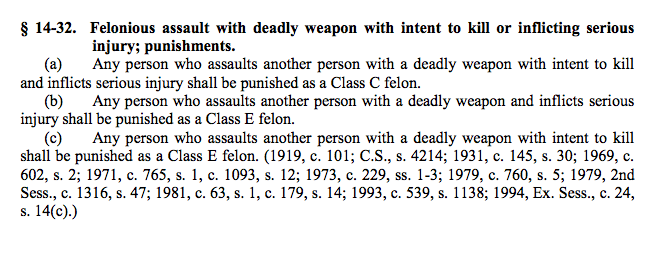
Does North Carolina Have Attempted Assault?
Attempted Aggravated Assault with a Deadly Weapon Inflicting Serious Injury – New North Carolina Crime
The North Carolina Supreme Court recently held in State v. Floyd that attempted assault is a recognized crime in North Carolina. The court explained in their decision what the newly recognized law is and how it will work.
Download: North Carolina v. Floyd
Overview of the Floyd Case
In State v. Floyd, the court considered the issue of whether a 2005 conviction of “attempted assault with a deadly weapon inflicting serious injury” could support later charges of possession of a firearm by a convicted felon, and habitual felon status (in order to bring such charges, the accused must have a prior felony conviction or convictions).
The defendant challenged the validity of his prior conviction at trial, arguing it was not a recognized crime in North Carolina, and therefore could not support either charge.
 See More: North Carolina Law 14-32
See More: North Carolina Law 14-32
The trial court denied the defendant’s motions to dismiss and the defendant was convicted of possession of a weapon of mass destruction, possession of a firearm by a convicted felon and habitual felon status. The Court of Appeals reversed the trial court’s decision, finding that the underlying charge of attempted assault with a deadly weapon was not recognized in North Carolina.
The state appealed the decision of the Court of Appeals and the Supreme Court of North Carolina reversed.
What is the new crime?
In Floyd, the North Carolina Supreme Court held that attempted assault with a deadly weapon inflicting serious injury is a recognized offense in North Carolina. The new crime was defined in Floyd as:
A person who intends to “assault another person with a deadly weapon and inflict ‘serious injury,’” and who does an overt act for that purpose going beyond mere preparation, but who ultimately fails to complete all the elements of this offense—for example, by failing to inflict a serious injury—would be guilty of the attempt rather than the completed offense. N.C.G.S. § 14-32(b).
The court emphasized that the new crime would only apply to one of two different types of assault in North Carolina that can be pursued by a police officer.
Does North Carolina Have More Than One Type of Assault?
Yes. North Carolina has two types of assault under common law:
Attempted Battery – The first type is often referred to as an attempted battery that is an arrestable offence by law enforcement. It places an emphasis on the intent or state of mind of the accused, and is defined as “an overt act or attempt, or the unequivocal appearance of an attempt, with force and violence, to do some immediate physical injury to the person of another.” These actions must be sufficient “to put a person of reasonable firmness in fear of immediate bodily harm.” State v. Roberts, 270 N.C. 655, 658, 155 S.E.2d 303, 305 (1967).
Show of Violence – The second type, which places an emphasis on the reasonable apprehension of another person, is defined by the “show-of-violence rule.”
This rule requires a show of violence by the accused that causes reasonable apprehension of immediate bodily harm or injury in another person, and can include a dangerous weapon, which causes the other person to engage in a course of conduct that he would not have otherwise followed (for example, leaving a place sooner than originally planned or taking an alternate route than normal, based on a threat or fear created by the accused). Id.
What’s the Difference Between Attempted Battery and Show of Violence in North Carolina?
The difference between the two is that the first type of assault requires some form of attempt and the second type does not.
More specifically, the first type includes a reference to attempt in the definition, “an overt act or attempt, or the unequivocal appearance of an attempt.” However, the second type (the show-of-violence rule) does not include any reference to attempt or involve an attempt to cause injury to another person.
Instead, the show-of-violence rule is based upon a violent act or threat of the accused that causes reasonable fear in another person which can be both harmful and offensive, rather than an attempted battery by the accused.
What is considered an “attempt” in North Carolina?
In North Carolina, an attempt to commit a crime has two elements: (1) intent to commit the crime, and (2) an overt act done for that purpose, going beyond mere preparation, but falling short of the completed offense. State v. Powell, 277 N.C. 672, 678, 178 S.E.2d 417, 421 (1971). Under North Carolina structured sentencing, an attempt crime is punishable by the next lower classification as the offense that the offender attempted to commit. N.C.G.S. § 14-2.5 (2015).
The charge of attempt can apply to a variety of crimes. However, the court has specified that a person cannot be indicted for an attempt to commit a crime, that itself, is an attempt crime. State v. Hewett, 158 N.C. 627, 629, 74 S.E. 356, 357 (1912). In other words, a person cannot be indicted for an “attempt to attempt.”
Which type of assault does the new crime apply to? Why doesn’t it apply to both?
The new crime applies only to the second type of assault, as defined by the show of violence rule.
The court explained in Floyd that the new crime does not apply to the first type of assault because a person cannot be indicted for an “attempt to attempt.” State v. Hewett, 158 N.C. 627, 629, 74 S.E. 356, 357 (1912). Applying the new crime to the first type of assault would amount to an “attempt to attempt” because not only is the new crime is an attempt crime, but so is the first type of assault (attempted battery).
However, applying the new crime to the second type of assault would not have the same result because it is not an attempt crime. Therefore, it is only applicable when applied to the second type of assault.
What does this mean moving forward?
The court’s decision in Floyd expands criminal law in North Carolina to include a crime that previously was not recognized. To be exact, the North Carolina Supreme Court’s decision overruled all prior case law that held an attempted assault as not being a recognized crime in North Carolina.
Floyd clarified the difference in North Carolina’s two types of assault and explained how attempt charges are applicable to assault crimes defined by the show-of-violence rule. As of Floyd, North Carolina will now recognize the crime, specifically “attempted assault with a deadly weapon inflicting serious injury.”
 Carolina Law Blog
Carolina Law Blog
